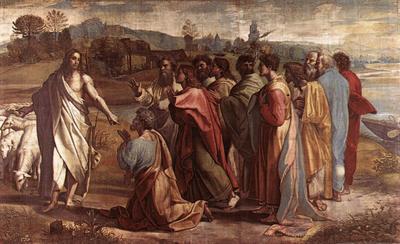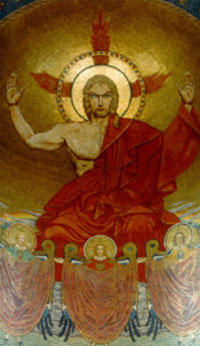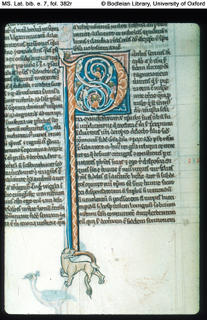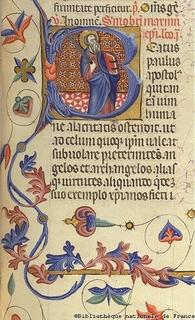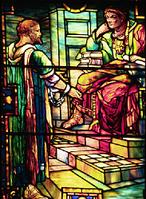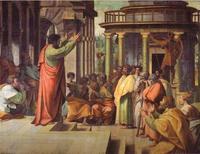
2 Timothy Chapter 3 (RSV)
1 Know also this, that, in the last days, shall come dangerous times.
2 Men shall be lovers of themselves, covetous, haughty, proud, blasphemers, disobedient to parents, ungrateful, wicked,
3 Without affection, without peace, slanderers, incontinent, unmerciful, without kindness,
4 Traitors, stubborn, puffed up, and lovers of pleasures more than of God:
5 Having an appearance indeed of godliness, but denying the power thereof. Now these avoid.
6 For of these sort are they who creep into houses, and lead captive silly women laden with sins, who are led away with divers desires:
7 Ever learning, and never attaining to the knowledge of the truth.
8 Now as Jannes and Mambres resisted Moses, so these also resist the truth, men corrupted in mind, reprobate concerning the faith.
9 But they shall proceed no farther; for their folly shall be manifest to all men, as theirs also was.
10 But thou hast fully known my doctrine, manner of life, purpose, faith, longsuffering, love, patience,
11 Persecutions, afflictions: such as came upon me at Antioch, at Iconium, and at Lystra: what persecutions I endured, and out of them all the Lord delivered me.
12 And all that will live godly in Christ Jesus, shall suffer persecution.
13 But evil men and seducers shall grow worse and worse: erring, and driving into error.
14 But continue thou in those things which thou hast learned, and which have been committed to thee: knowing of whom thou hast learned them;
15 And because from thy infancy thou hast known the holy scriptures, which can instruct thee to salvation, by the faith which is in Christ Jesus.
16 All scripture, inspired of God, is profitable to teach, to reprove, to correct, to instruct in justice,
17 That the man of God may be perfect, furnished to every good work.
Throughout this epistle Paul has passionately urged Timothy to preserve and transmit "the gospel which thou hast heard of me in faith" (2 Timothy 1:13). He calls it, "my gospel" (2 Timothy 2:8). He does not mean that he owns it, but he means to distinguish the gospel which he has received and transmitted to Timothy, from the many other false gospels being spread by false teachers.
Now Paul tells us something about these false teachers. He characterizes them not so much by their erroneous doctrine as by their unseen, disordered passions and sinful lives. They perhaps present an "appearance... of godliness" but deny its power (2 Timothy 3:5). What does this mean? Paul explains.
He compares them to Jannes and Mambres, whose names Paul knows not from Scripture -they are named nowhere else in the Bible- but by oral tradition. These men were Pharoah's magicians, who when confronted with Moses, God's appointed messenger, resisted him and his message. When Moses displayed God's power through his staff turned serpent, Jannes and Mambres likewise produced serpents from staffs. Whether their sign was a clever magician's trick or was brought about by demonic power, the purpose of their counterfeit sign was to discredit Moses and deny the truth of his testimony. Even though Moses' serpent devoured the others, the magicians' efforts contributed to the hardening of Pharoah's heart as well as their own.
Similarly, the false teachers of whom Paul warns Timothy produce a false sign -the appearance of godliness- to conceal the reality that they are not sent by God and do not bear His message. Their "appearance of godliness" -a sham holiness and supposed knowledge of spiritual things- is skin deep, for their lives contradict the truth that God truly gives the power to turn from sin and grow in holiness. These false teachers do not believe or wish to believe that such transformation is possible or necessary.
From the first centuries of Christianity, some heretics promoted the error that only the soul is good, and all matter is evil; therefore, they taught, we should expect the body to desire and to naturally carry out evil acts, and that temptations to such sins can be irresistible. If they are irresistible, we aren't culpable for giving in to them. These heretics taught that if the body is evil, it is futile to try to make it behave virtuously. In the end, they held that salvation for Christians is salvation of the spirit, and the body can be permitted to run its course of sin.
Paul seems to be addressing just this sort of error. He identifies "silly women laden with sins" (2 Timothy 3:6) as particularly vulnerable to the lie that we can not resist temptations to sin. Women -then, just as now in many places- are too often victimized by men seeking conquest and sexual gratification without cost or consequence. The false teachers condemned by Paul in this chapter perhaps included some who were spreading a false message as a means for taking advantage of women in a particularly demeaning way: their victims would be left with an increased burden of guilt from which they would feel powerless to be freed. For them, the Gospel has been emptied of its power to bring about godliness.
In contrast, Paul's gospel is one of salvation for the whole person, body and soul, and a life transformed by the Gospel is one illuminated by holiness and virtue.










